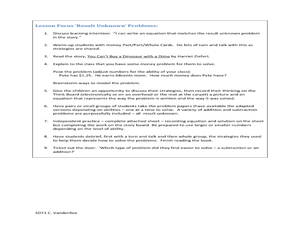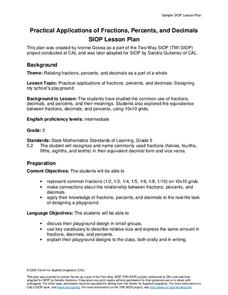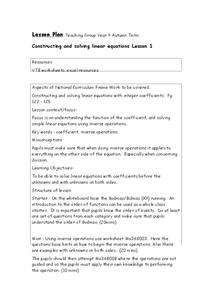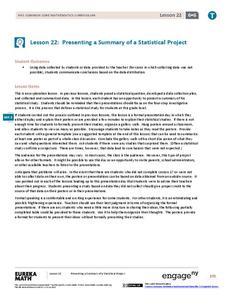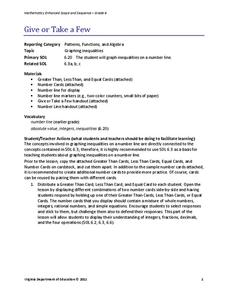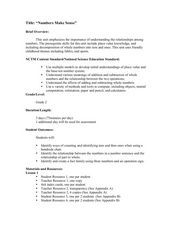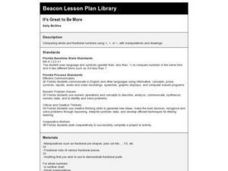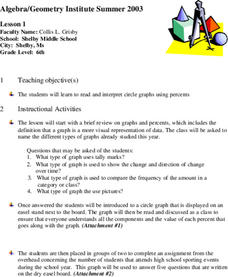Science Matters
Volcano Models
More than 80 percent of the earth's surface originated from volcanoes. The 16th lesson in a 20-part series introduces the shape and development of volcanoes. It begins with a demonstration using a balloon and flour to illustrate the...
EngageNY
Solving Percent Problems
Don't discount how much your pupils understand percents! The 27th lesson in a series of 29 presents a problem to find the cost of a discounted outfit. Small groups determine either the original price or the discount received given the...
Curated OER
Carry and Borrow
Second graders complete basic math computations. In this addition and subtraction lesson plan, 2nd graders learn how to carry and borrow numbers when adding and subtracting. Students learn a carrying song to help them remember. ...
EngageNY
Solving Percent Problems II
Fill in the blanks to find the best discount! Groups complete a table of amounts and percents associated with sale items. Classmates then find the original cost, sale cost, discount amount, paid percent, or the discount percent...
Curated OER
Pie Graph
Fifth graders examine fractional parts of pie graphs. Given a bag of M&Ms, 5th graders interpret the data. They use a paper plate and colors to create a graph of the types of M&Ms represented.
Curated OER
Book Title: You Can’t Buy a Dinosaur with a Dime
Students explore the concepts of multiple digit addition and subtraction. In this addition and subtraction lesson, students read the book You Can’t Buy a Dinosaur with a Dime and then discuss methods for solving a particular math...
Curated OER
Fraction City
Welcome to Fraction City! This is an incredibly interactive and fun way to teach properties of fractions, and reaches multiple learning styles. Scholars create "blocks" by folding strips of paper in various increments (thirds, fourths,...
Virginia Department of Education
Similar Triangles
Pupils work in pairs to investigate what it takes to prove that two triangles are similar. They work through various shortcuts to find which are enough to show a similarity relationship between the triangles. Small groups work with the...
Virginia Department of Education
Angles, Arcs, and Segments in Circles
Investigate relationships between angles, arcs, and segments in circles. Pupils use geometry software to discover the relationships between angles, arcs, and segments associated with circles. Class members use similar triangles to...
EngageNY
Solving Percent Problems III
What happens when combining percentage discounts? The last lesson in a series of 29 introduces the idea of combining discounts one after another. Pupils wrestle with the claim that to find the total discount, they need to only add...
Center for Applied Linguistics
Practical Applications of Fractions, Percents, and Decimals
Young architects are prompted to design a playground in assigned groups. Using a 10 x 10 grid. Your fifth graders will apply their knowledge of fractions, percents, and decimals to the real-world task of designing a playground....
Virginia Department of Education
Types of Variations
Scholars determine how two quantities vary with respect to each other. They complete a fill-in-the-blank activity by stating whether the entities vary directly, inversely, or jointly, create equations that match different variations, and...
Curated OER
Constructing and Solving Linear Equations
Students construct and solve linear equations. In this algebra lesson, students solve equations and graph lines using the slope. They identify the different parts of an equation including the leading coefficient.
EngageNY
Presenting a Summary of a Statistical Project
Based upon the statistics, this is what it means. The last lesson in a series of 22 has pupils present the findings from their statistical projects. The scholars discuss the four-step process used to complete the project of their...
Virginia Department of Education
Give or Take a Few
Young mathematicians extend their knowledge of rational numbers on a number line to graph inequalities by first using number cards to compare rational numbers. They finish by using similar reasoning to graph inequalities on a number line.
Curated OER
Making Blood!
students research blood's components, and use their math skills to recreate a model of whole blood using commonly found food items.
Curated OER
Numbers Make Sense
Second graders explore number values by completing estimation problems in class. In this place value lesson, 2nd graders identify the use of decimals in numbers and how they relate to fractions or parts of a whole. Students utilize flash...
Curated OER
Giggle, Giggle, Quack Pizza Fractions
Students explore the concept of multiplication by using pizza. They read an article discussing how math is used everyday. They try to determine how many pizzas they would need to feed the class.
Curated OER
Fractions in Shapes
First graders explore fractions with manipulatives. In this fraction activity, 1st graders use paper foods such as sandwiches and pizza in order to find halves, thirds, fourths, eighths, and more. This activity is divided up into 3 tiers...
Curated OER
It's Great to Be More
Students compare whole and fractional numbers using <, >, or =, with manipulatives and drawings.
Curated OER
Circle Graphs
Sixth graders participate in a lesson that covers the reading and interpretation of a circle graph. They review the part of a whole concept for percents and student observe and practice using the circle graph.
Curated OER
Comparing Fractions
Fifth graders differentiate between large and small fractions using drawings to represent the value. The lesson includes written dialogue for teachers tell students. The author recommends the use of fraction tiles for manipulatives.
Curated OER
Shapes
Students examine various shapes and discover each part is the total of counterparts. In groups, they combine parts to equal a whole and divide numerous shapes into various parts. They practice drawing shapes and writing them in a...
Curated OER
Fractions
First graders are asked to put their fingers on their triangles that looks like the one that is on the overhead. They are asked to tell how they would write a fraction for this one part. Students go through step one until all of the...





